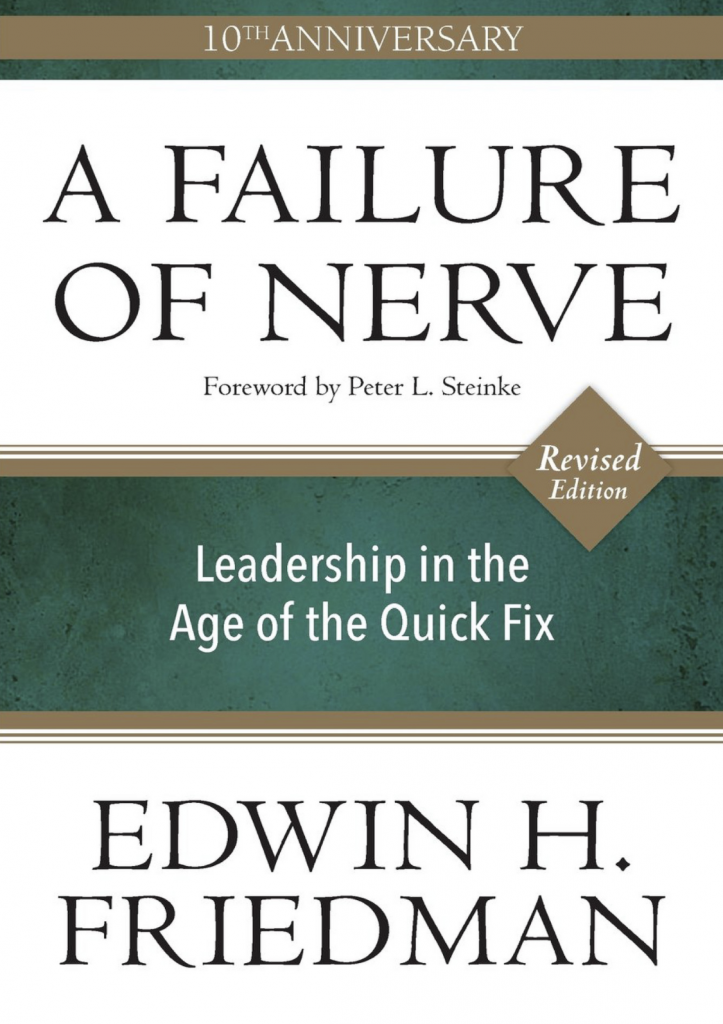Key Quote:
“Rather, I mean someone who has clarity about his or her own life goals, and, therefore, someone who is less likely to become lost in the anxious emotional processes swirling about. I mean someone who can be separate while still remaining connected, and therefore can maintain a modifying, non-anxious, and sometimes challenging presence. I mean someone who can manage his or her own reactivity to the automatic reactivity of others, and therefore be able to take stands at the risk of displeasing” (p. 14). — Edwin H. Friedman
Key Points and Concepts
Four Trends Corrupting America’s Orientation Toward Leadership
“A regressive, counter-evolutionary trend in which the most dependent members of any organization set the agendas and where adaptation is constantly toward weakness rather than strength, thus leveraging power to the recalcitrant, the passive-aggressive, and the most anxious members of an institution rather than toward the energetic, the visionary, the imaginative, and the motivated” (p. 12). In this setting, institutions revert to the weakest link instead of attaching themselves to the strongest, most progressive members of the group. This hampers them and keeps them from achieving their ultimate potential.
“A devaluation of the process of individuation so that leaders tend to rely more on expertise than on their own capacity to be decisive. Consultants (to both families and organizations) contribute further to this denial of individuation by offering solutions instead of promoting their clients’ capacity to define themselves more clearly” (p. 12). This refers to all members of the group trying to become homogenous instead of acting as a collection of individuals. Using a biological metaphor, Friedman notes that species of identical specimens are weak and subject to extermination when confronted with a changing environment. Institutions should instead strive for diversity and variety to increase their likelihood of success. Consultants play into this by telling leaders what everyone else is doing instead of allowing them to chart their own course toward success.
“An obsession with data and technique that has become a form of addiction and turns professionals into data-junkies and their information into data junkyards. As a result, decision-makers avoid .or deny the very emotional processes within their families, their institutions, and within society itself that might contribute to their institution’s ‘persistence of form’” (p. 12). Too often leaders wait to make decisions until they have all of the information, but complete information rarely occurs. Leaders must act on the instincts and beliefs that brought them to power instead of relying solely on data to make their decisions.
“A widespread misunderstanding about the relational nature of destructive processes in families and institutions that leads leaders to assume that toxic forces can be regulated through reasonableness, love, insight, role-modeling, inculcation of values, and striving for consensus. It prevents them from taking the kind of stands that set limits to the invasiveness of those who lack self-regulation” (pp. 12-13). Similar to the first trend, groups often will try to preserve the weakest link when they should be forging ahead with the strongest members of the group.
Key to a Successful Group: A Well-Differentiated Leader
A well-differentiated leader does not equal an autocrat. “Rather, I mean someone who has clarity about his or her own life goals, and, therefore, someone who is less likely to become lost in the anxious emotional processes swirling about. I mean someone who can be separate while still remaining connected, and therefore can maintain a modifying, non-anxious, and sometimes challenging presence. I mean someone who can manage his or her own reactivity to the automatic reactivity of others, and therefore be able to take stands at the risk of displeasing” (p. 14).
Later in the book, Friedman discusses the difference between focusing on one’s self and being selfish. In modern society, people perceive leaders focusing on themselves as selfish and attack them for it. In fact, it is imperative for leaders to focus on themselves so that they can maintain an objective perspective on the group they lead and steer it in the proper direction.
Below is a list of behaviors leaders can employ to become well differentiated (p. 183):
• Differentiation is the capacity to take a stand in an intense emotional system.
• Differentiation is saying “I” when others are demanding “we.”
• Differentiation is containing one’s reactivity to the reactivity of others, which includes the ability to avoid being polarized.
• Differentiation is maintaining a non-anxious presence in the face of anxious others.
• Differentiation is knowing where one ends, and another begins.
• Differentiation is being able to cease automatically being one of the system’s emotional dominoes.
• Differentiation is being clear about one’s own personal values and goals.
Five Characteristics of Chronically Anxious Families
When using the term “anxious,” Friedman refers to high-stress, non-cohesive, dysfunctional families. While Friedman identified these characteristics during his time as a family therapist, he found that they apply to all groups with weak leadership (pp. 53-54).
• Reactivity: the vicious cycle of intense reactions of each member to events and to one another.
• Herding: a process through which the forces for togetherness triumph over the forces for individuality, thus moving everyone to adapt to the least mature members.
• Blame displacement: an emotional state in which family members focus on forces that have victimized them rather than taking responsibility for their own being and destiny.
• A quick-fix mentality: a low threshold for pain that constantly seeks symptom relief rather than fundamental change.
• Lack of well-differentiated leadership: a failure of nerve that both stems from, and contributes to, the first four.
The Problem with Empathy
“According to the Oxford English Dictionary, the word empathy was first employed in 1922, when a need arose to translate a German word in the field of aesthetics…The original intent of the word empathy was to convey how projecting oneself into a work of art (painting, sculpture, theater) would enable a viewer to appreciate better the creation being observed…While the adjective empathetic appears in some psychological essays at the beginning of the twentieth century, it was not until after World War II that the word empathy itself became part of common parlance, as it jumped from the realm of art appreciation to that of human relationships” (p. 136).
In groups or organizations, empathy can cripple leaders and prevent them from making the decisions necessary for the greater good of the group. If leaders always make decisions with empathy as a top priority, it will result in acting with those most negatively impacted by a decision in mind instead of how it will position the group for success in the future. “It is in this sense that promoting in others the initiative to be accountable is far more critical to the health of an institution than trying to be understanding or insightful” (p. 147).
Friedman, E. (2007). A Failure of Nerve: Leadership in the Age of the Quick Fix. New York: Seabury Books.

“A regressive, counter-evolutionary trend in which the most dependent members of any organization set the agendas and where adaptation is constantly toward weakness rather than strength, thus leveraging power to the recalcitrant, the passive-aggressive, and the most anxious members of an institution rather than toward the energetic, the visionary, the imaginative, and the motivated.”
In modern society, people perceive leaders focusing on themselves as selfish and attack them for it. In fact, it is imperative for leaders to focus on themselves so that they can maintain an objective perspective on the group they lead and steer it in the proper direction.
When using the term “anxious,” Friedman refers to high-stress, non-cohesive, dysfunctional families. While Friedman identified these characteristics during his time as a family therapist, he found that they apply to all groups with weak leadership.
